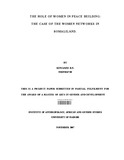| dc.description.abstract | Conflicts and wars are justly argued as a patriarchal phenomenon and the role of women
is more often than not obscured under the guise of passiveness and victim hood. This
study sought to explore the role of the Somaliland (a region within the international
borders of the republic of Somalia but not recognized internationally) women in bringing
and sustaining peace in the region. Somaliland has been enjoying peace and stability in
the Horn of Africa region as opposed to the rest of Somalia which still experiences civil
strife.
Women's roles in peace building processes are multidimensional and sometimes
invisible, as they are considered to be supportive rather than central to the processes.
Thus there is need to document the centrality of women's roles in peace building
especially from a traditional mechanisms point of view to provide an insight to the
challenges, best practices and recommendations for integration in global peace processes.
To reach the goals of the study, a women's network in Somaliland, Nagaad umbrella
network was identified as the unit of study in order to explore the role that women
networks played and still continue to play in the peace building arena. In-depth
interviews, Key informant interviews, Focus Group Discussions and semi structured
questionnaires provided the research data which was analyzed using both quantitative and
qualitative tools.
The data collected and analyzed indicates that Somaliland women were very active in
advocating and lobbying for peace in the form of peace marches and campaigns, through
which they passed their information through songs, dance and poetry. The Somaliland women also mobilized into groups easily to amplify their voices and further consolidated to form active networks, which still exist to-date, to coalesce their skills in advocating and lobbying. To ensure that ceasefires and peace negotiations were upheld, the Somaliland women sold their valuables e.g. jewellery, to support logistics and any financial needs. However this activism never translated to positions of power as the power sharing was and still is on the basis of the clans. Traditions and culture were also established as other barriers to women's participation and this is further exacerbated by high illiteracy and lack of information among the women.
Women's skills to mobilize and advocate for peace informally should be upheld, integrated and institutionalized as a Unique strategy to achieve sustainable peace by stakeholders, authorities and Governments. A concerted effort should be made towards the promotion of women's rights as a key strategy to ensure that a critical mass of both men and women participate in peace building. A conducive environment should ideally exist to ensure that women as well as men participate; this can be achieved through gender sensitive policies which enshrine affirmative action for women's leadership and quotas for women in decision making processes and positions. Documentation of the role of women is also key as an advocacy tool for sensitizing all stakeholders on the important role played by women in the peace building processes. | en |

